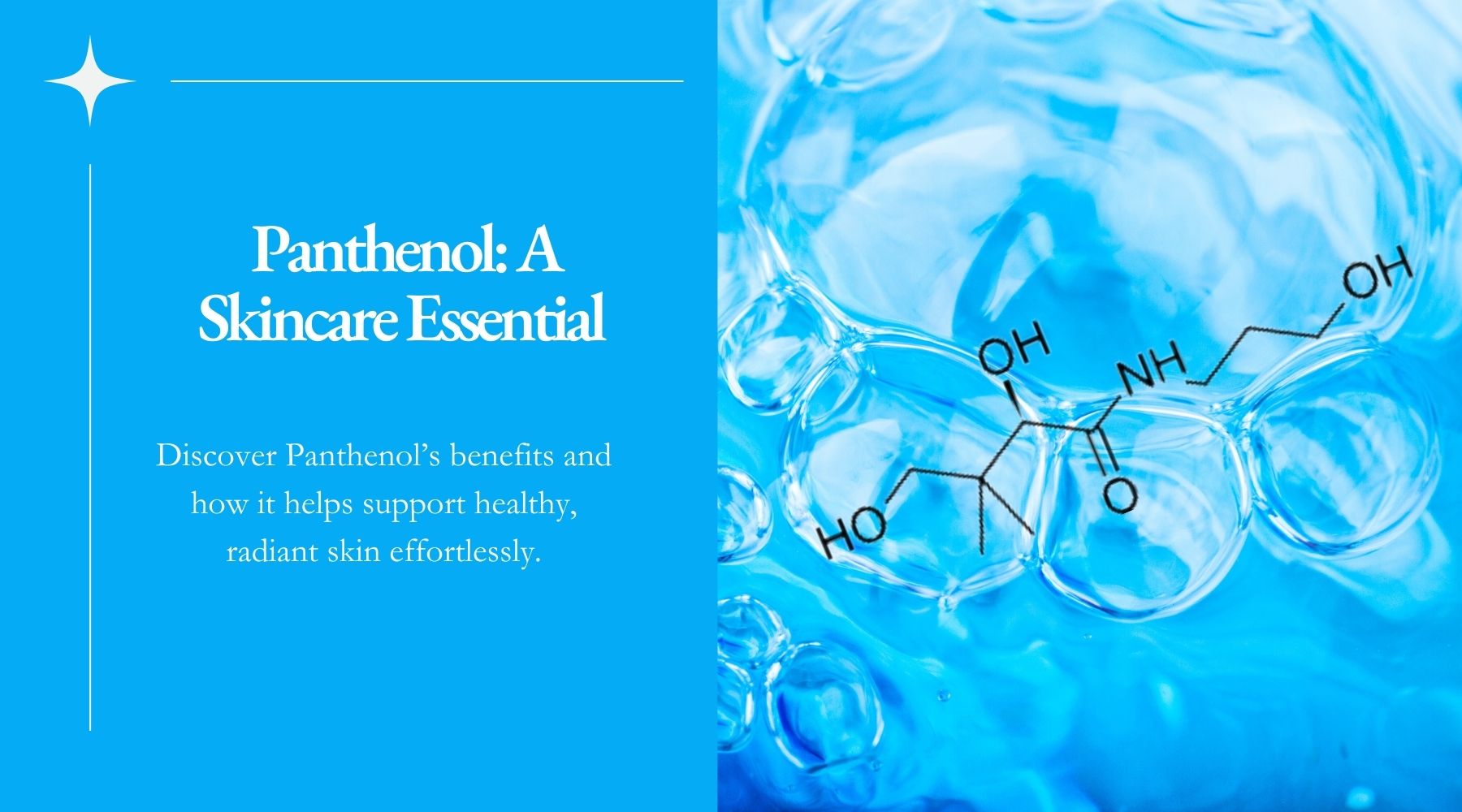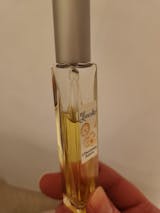Introduction
Panthenol has swiftly become a cherished ingredient in the realm of skincare. Known for its multifaceted benefits, this potent compound is a cornerstone in many beauty regimens. But what exactly is Panthenol, and why has it garnered such acclaim? Let’s delve into the science and magic behind this skincare essential.

Understanding Panthenol: A Brief Overview
What is Panthenol?
Panthenol, also referred to as provitamin B5, is a derivative of pantothenic acid. It’s an alcohol analog that transforms into vitamin B5 when applied to the skin. This transformation is key to its efficacy in skincare products.
Origins of Panthenol
Panthenol originates from pantothenic acid, a naturally occurring substance found in both plants and animals. Its discovery dates back to the early 20th century, but it wasn’t until later that its cosmetic potential was fully realized.
Chemical Structure and Properties
Chemically, Panthenol is an alcohol derivative, specifically the D-panthenol form that is most commonly used in skincare. It’s known for its hygroscopic properties, meaning it can attract and retain moisture, which is vital for skin hydration.
The Science Behind Panthenol in Skincare
How Does Panthenol Work on the Skin?
Panthenol’s effectiveness stems from its ability to penetrate deeply into the skin, where it undergoes conversion to vitamin B5. This vitamin is essential for maintaining skin health.
Mechanism of Action
Upon application on skin, panthenol also known as provitamin B5 penetrates the skin, and is converted to pantothenic acid, a vital component of coenzyme A, which is crucial for skin health.
It is involved in fatty acid metabolism and cellular energy production, enhances the proliferation of fibroblasts, the cells responsible for producing collagen as well as elastin, and is vital for skin repair and regeneration. This leads to improved skin structure and elasticity.
Skin Penetration and Absorption
Panthenol’s small molecular size allows it to penetrate the skin’s outermost layer efficiently. It is absorbed quickly, ensuring rapid hydration and repair.

Key Benefits of Panthenol for Your Skin
Hydration and Moisture Retention
Panthenol is a superb humectant. It draws moisture from the environment into the skin, providing lasting hydration. This helps in maintaining a supple, plump appearance.
Skin Barrier Repair
Panthenol fortifies the skin barrier by stimulating the production of lipids and proteins. This strengthens the skin’s natural defense against environmental aggressors.
Anti-Inflammatory Effects
Panthenol possesses significant anti-inflammatory properties. It soothes irritation and redness, making it an excellent ingredient for sensitive and reactive skin types.
Panthenol's Role in Anti-Aging
Does Panthenol Help with Wrinkles?
Yes, by promoting fibroblast activity, Panthenol aids in collagen and elastin production, foundational proteins for skin structure, which reduce the appearance of fine lines and wrinkles overtime.
Does Panthenol Tighten Skin?
Similarly due to the stimulation of collagen and elastin production, Panthenol improves skin elasticity thus leading to a firmer, less textured skin over time.
Panthenol for Other Skin Concerns
Does Panthenol Remove Dark Spots?
While Panthenol itself is not a depigmenting agent, its skin-repairing properties can improve overall skin tone and texture, aiding in the reduction of dark spots when used with other brightening agents.
Panthenol for Acne and Blemishes
Panthenol’s anti-inflammatory and healing properties make it effective in soothing acne and promoting faster recovery of blemishes.
Soothing Eczema and Psoriasis with Panthenol
Panthenol is particularly beneficial for conditions like eczema and psoriasis due to its calming and moisturizing effects, helping to alleviate symptoms and improve skin barrier function.
Incorporating Panthenol into Your Skincare Routine and Daily Use of Panthenol on Your Face
Can I Use Panthenol on My Face Every Day?
Yes, Panthenol is gentle enough for daily use. Its non-irritating nature makes it suitable for all skin types, including those with sensitive skin.
Best Practices for Daily Application
Panthenol can be used both in the morning and at night, making it a versatile addition to your skincare routine.
Morning Use: Using panthenol in the morning can help hydrate your skin throughout the day, creating a protective barrier against environmental stressors such as pollution and UV exposure. It can be particularly beneficial when used under sunscreen and makeup, as it helps maintain skin moisture and improves overall skin texture.
Night Use: At night, panthenol aids in skin repair and regeneration. During sleep, the skin undergoes its natural healing process, and applying panthenol can enhance this by providing deep hydration and soothing any irritation or redness. It helps in replenishing the skin barrier, making your skin more resilient by morning.

Enhancing Panthenol Benefits with Other Actives
Panthenol pairs well with other actives such as niacinamide, fatty acids, and peptides. Together, they have been shown to enhance barrier protection and improve skin appearance. Apply it after cleansing to maximize its benefits.
Conclusion
Panthenol is a versatile ingredient that provides exceptional hydration, fortifies the skin barrier, and soothes inflammation. Its versatile properties support skin healing and overall health. Incorporating panthenol into your skincare routine ensures a resilient, radiant complexion.
Frequently Asked Questions about panthenol in Skincare
Question 1. Is it better to use panthenol in the morning or at night?
Either is fine. Panthenol can be incorporated into your morning and/or evening routine. It is very versatile and can be integrated with no irritation easily.
Question 2. Can I use panthenol under my eyes?
Yes, panthenol can be used under the eyes. The delicate skin in this area can benefit significantly from its hydrating and soothing properties.
Question 3. Is panthenol better than hyaluronic acid?
Both are excellent hydrators. However, Panthenol also offers anti-inflammatory and skin-repairing benefits, making it more versatile, while topical hyaluronic acid is too big to have any other effect than hydration.
Question 4. Does Panthenol Increase Collagen Production?
Yes, Panthenol stimulates fibroblast activity, which is crucial for collagen synthesis, thereby supporting skin structure and resilience.
Learn More
At Lancolia, we harness the power of panthenol to deliver effortless skincare results. This vital ingredient is integral to our formulations, providing deep hydration, enhancing skin barrier function, and soothing inflammation. By incorporating panthenol into our products, we ensure that your skin receives the nurturing care it needs to maintain a radiant and resilient complexion with a simple yet effective routine.
Explore our range to experience the synergy of science and luxury in every application.
References
Draelos, Z.D. "The science behind skin care: moisturizers." J Cosmet Dermatol 7, 2–7 (2008).
Baumann, L. "Cosmetic Dermatology: Principles and Practice." McGraw-Hill Education, New York, 2009.
Gorsky, J. “Dexpanthenol in Wound Healing after Medical and Cosmetic Interventions” Pharmaceuticals 2020, 13(7), 138.
Draelos, Z.D. "A clinical evaluation of the combination of topical niacinamide and panthenol in improving the appearance of facial and neck ageing." Br J Dermatol 162, 1323–1328 (2010).
Camargo, F., Gaspar, L. and Pm, M. (2011) "Skin moisturizing effects of panthenol-based formulations.", Journal of Cosmetic Science.







